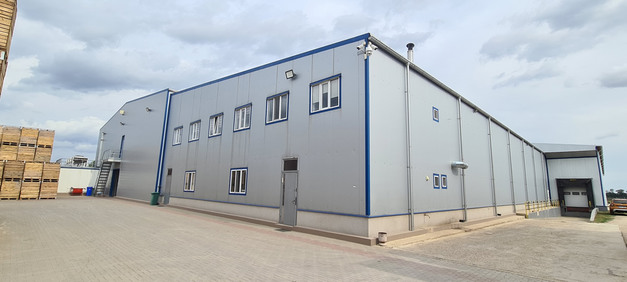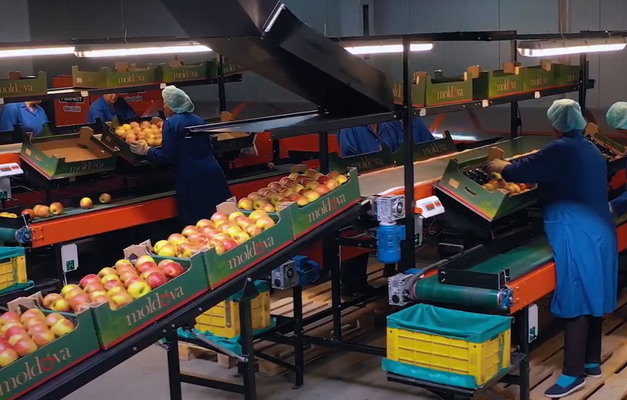
In recent years, the labor shortage has become hugely challenging for Western European fruit and vegetable companies. Surprisingly, it is just as big a problem for growers in Eastern European countries like Moldova.
"Labor isn't as cheap anymore, and it's often not high-quality. We'll have to get migrant workers in the future," begins Ion Tulei, commercial director of Farmprod, an apple and cherry company based in southeastern Moldova.
Ion Tulei, Commercial Director of Farmprod
"Moldovan horticultural workers prefer going to Western Europe. The pay's higher there, but it's a mentality issue too. If I promise my harvesters the same wages as in the Netherlands, provided they work just as hard, they'll turn me down. There, everything gets done quickly and well; here, there are vast differences in the quality of the work done. There are certainly pickers who work hard, but there are also those who'll always only give 40%. We don't pay per hour but per crate harvested if the quality's satisfactory." In recent years, Moldovan growers have begun employing people from India and Uzbekistan.
Superintensive cultivation
To improve efficiency in the orchards, including harvesting, Farmprod - a company founded by three families in 2009 who planted ten hectares of apples - is gradually replacing the outdated plots with superintensive cultivation of high-performing rhizomes and market-oriented varieties. "We naturally made some mistakes in the beginning. We've changed a lot of, especially plum and cherry rootstocks. Currently, we have 130 hectares; that's enough for now," says Ion.
"We're now focusing on variety diversification and better cultivation methods to boost productivity and quality. That's already quite successful on some plots. For example, we harvest an average of 60 tons of Galas per hectare." On the new apricot plots with a 4x1.5 planting distance, good rhizomes, and tree support, Farmprod will bring in 40-45 tons per hectare, compared to 20 tons, where the plants are still set up in a 6x3 scheme.
New plantings
In cherry cultivation, rain nets are essential to keep quality as high as possible. "We get little hail in our area; the rain is the cherries' enemy. We already have nets covering three hectares, but it's very expensive, so we can only gradually cover all the cherry orchards. Another advantage is that the net-covered cherries can be harvested a little later because the temperature under the nets is lower. That gives us a wider marketing window," Ion explains.
Plums to Germany
Regarding exports, Farmprod sends its entire plum crop to EU. "Four years ago, nobody in Europe knew about Moldovan plums, now demand increases annually. We have the advantage of entering an empty market with our plums. But I see a bright future for other Moldovan stone fruit in Western Europe too. Our apricots are sweet and of excellent quality."
Plums for Germany
Turkish competition for cherries
There was no space on the European market for cherries this year, says Tulei. "It will already be full of Turkish cherries. We marketed our fruit in Russia, where people will pay more for Moldovan than Turkish cherries. They appreciate the better quality and taste. In Europe, they don't know our cherries yet, so they tend to pay the same as the Turkish ones. We still have some promotional work to do there," he says.
Gala apples
Air freight exports to markets further away are not an option. "That's not possible from Chisinau for now. We'd have to divert to Istanbul or Budapest, and then the cherries first have a long, expensive journey by road. That wastes precious time. Plus, buyers usually only want two or three tons. Logistically, that's difficult and unprofitable because the trucks are only one-tenth full."
The storage cells
Apples to the Middle East
Last year, Farmprod sold 60% of its apples on the Russian market. Most of the rest went to the Middle East, with a few going to the local market. "We grow many varieties, including Jeromine, Fuji, and Gala. So we can supply the Middle East, Europe, and any other market. This year, we'll focus on the Arabian market," says Ion, "but we can no longer use the port of Odessa, which is only 50km from our packing station."
"We now have to go to Constanza in Romania. That’s pretty far away - 500 km - so it takes a week before the apples reach the ships. There are many customs-related delays at the border and port. That doesn't cause quality problems; the apples can handle it. But it costs far more than exporting via Odessa. We're talking $2,500 extra per shipment; that's an additional 12 cents per kilo," concludes Ion.

Every year, Farmprod harvests 3,000 tons of apples, cherries, plums, and other stone fruit. The company has a 4,500-ton cold storage capacity and a sorting and packing line. Its fruits are GlobalGAP certified. The fruits are exported to Russia, EU and since 2018 also to the Middle East and Bangladesh. In addition to growing fruit, the company also grows fruit trees for itself and fellow growers.
Click here to take a virtual tour of the Farmprod cultivation company.
For more information:
Ion Tulei (Commercial Director)
Farmprod
str. Alexandru cel Bun 62
Olanesti (Stefan Voda) – Moldavië
Tel: +373 78194401
[email protected]
